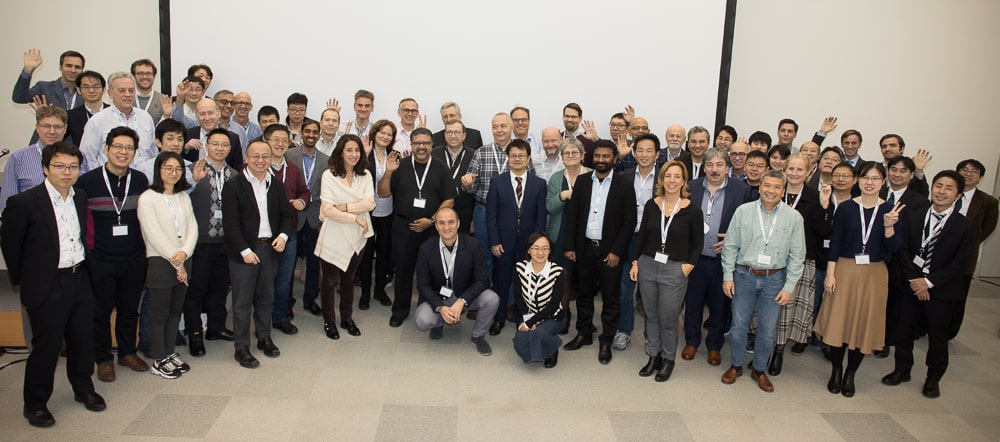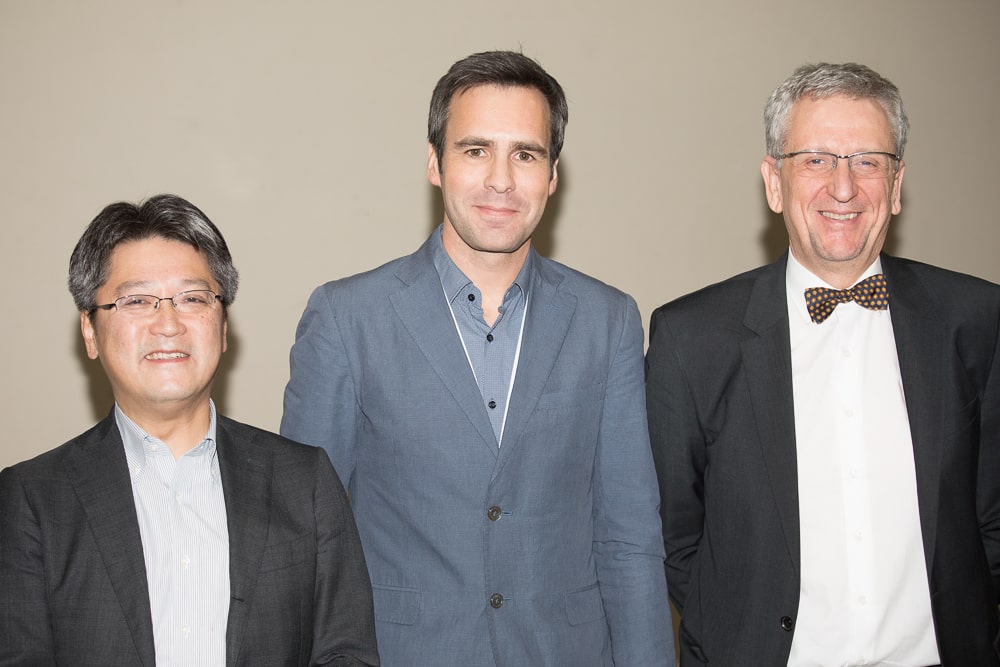NFV#28 full of surprises in Japan
ETSI ISG NFV was warmly welcomed back to Japan for NFV#28! Five years have passed since the group was in Okinawa in May 2014 for NFV#6.
This time, the ETSI NFV Industry Specification Group (ISG) met from 2 to 6 December 2019 at Across Fukuoka in Fukuoka, Japan. Fukuoka is located on the north of Kyushu, the southernmost of the four major Japanese islands. Fukuoka is well known for its local food, especially, the Hakata-Ramen, which are extremely tasteful and popular. In addition, it was the perfect season to see autumn leaves in Japan.
In the opening plenary, Diego Lopez the ISG chair, shared his current perspectives on NFV standardization and the industry’s landscape using a Japanese cartoon. I feel the technology trends around the network industry are getting shorter whilst the scope continues to broaden in response to the demands of network technology evolution, the expansion of open source, and new use cases. I think our ETSI NFV community is adjusting towards the right way forward from a standards point of view and cooperating with other SDOs remains important. Release 4 is going at full speed, and as an example, the discussion around container technology and its adaptation for NFV use cases is gaining much more momentum, with an increasing number of work items and related contributions.
After the opening plenary, NEC hosted a social event for ETSI NFV delegates. Hiroyuki Oto (NTT DOCOMO), a former leader of NFV development at NTT DOCOMO, who was also present at NFV#6, provided an overview of DOCOMO’s NFV deployment and standardization. Some readers may also remember the famous statement of “NFV technology was the pie in the sky” at NFV#6. In Fukuoka he declared that 40% of the core network in NTT DOCOMO has been virtualized covering a wide 80% with regards to the types of core network functions. He also mentioned the importance of the standardization efforts done by ETSI NFV to support and foster interoperable multi-vendor NFV deployments.
Then Diego Lopez surprised us all: Joan Triay (NTT DOCOMO), our ISG Technical Manager, chair of the Technical Steering Committee (TSC), received an NFV Award in recognition of his extraordinary and brilliant contribution to the ETSI NFV ISG, his strong leadership and meticulous guidance of the work programme. I am very proud of him for his efforts towards NFV standardization and tight collaboration set in between development and standardization.
The long and intense days of NFV#28 were a catalyst to accelerate great progress by drafting, reviewing and revising the many contributions submitted by the NFV community. A very fruitful week.
Here are a few highlights to demonstrate the excellent progress made:
- A fifth round of Release 2 Stage 3 maintenance specifications have been completed. Lots of improvements have been introduced after taking into consideration feedback received from NFV development projects. A sixth round of maintenance is planned to start beginning of 2020 which is targeted for completion in the first half of 2020.
- The feature related to Cloud-Native VNF and NFV Architecture PaaS support (with now the main normative works happening as a part of Release 4) was the focus of some deep discussions, with a large number of contributions handled in work items such as,
- DGS/NFV-IFA036, dealing with the specification of requirements for the management and orchestration of container cluster nodes,
- DGR/NFV-IFA038, a report on network connectivity for container based VNF, and
- DGS/NFV-IFA040, addressing requirements for service interfaces for OS container management and orchestration.
In Fukuoka, the ISG plenary also approved a big set of final drafts, which will be soon published:
- RGR/NFV-003ed151 (ETSI GR NFV 003) "Terminology for Main Concepts in NFV”
- Outputs related to Release 2 maintenance, such as:
- RGS/NFV-SOL002ed271 (ETSI GS NFV-SOL 002) "Protocols and Data Models; RESTful protocols specification for the Ve-Vnfm Reference Point".
- RGS/NFV-SOL003ed271 (ETSI GS NFV-SOL 003) "Protocols and Data Models; RESTful protocols specification for the Or-Vnfm Reference Point"
- RGS/NFV-SOL004ed271 (ETSI GS NFV-SOL 004) "Protocols and Data Models; VNF Package specification"
- RGS/NFV-SOL006ed271 (ETSI GS NFV-SOL 006) "Protocols and Data Models; NFV Descriptors based on YANG Specification"
- RGS/NFV-SOL007ed271 (ETSI GS NFV-SOL 007) "Protocols and Data Models; Network Service Descriptor File Structure Specification"
- RGS/NFV-SOL013ed271 (ETSI GS NFV-SOL 013) "Protocols and Data Models; Specification of common aspects for RESTful NFV-MANO APIs"
- RGR/NFV-TST007ed261 (ETSI GR NFV-TST 007) "Testing; Guidelines on Interoperability Testing for MANO "
- And new documents, such as:
- DGR/NFV-TST006 (ETSI GR NFV-TST 006) "Testing; Report on CICD & Devops"
Other final drafts of other maintenance work items are currently under ISG approval via remote consensus, including the v2.7.1 versions of RGS/NFV-SOL001, RGS/NFV-SOL005, and RGS/NFV-SEC022. Two other work items were also completed and the final drafts delivered, for which an approval is also now ongoing via remote consensus, including:
- DGS/NFV-SOL011ed331 (ETSI GS NFV-SOL 011) "Protocols and Data Models; RESTful protocols specification for the Or-Or Reference Point", and
- DGS/NFV-SOL015 (ETSI GS NFV-SOL 015) "Protocols and Data Models; Specification of Patterns and Conventions for RESTful NFV-MANO APIs".
The next ETSI NFV plenary will be NFV#29 (February 17th to 21st) hosted by ETSI in Sophia-Antipolis, France. We are all looking forward to having yet another successful meeting in Provence & Cote d’Azur in February, hopefully with good opportunities for our NFV delegation to enjoy some nice weather.
As the holidays are coming, I and the rest of the NFV Leadership team would like to “wish you all a Very Merry Christmas, Happy Holidays and Happy New Year”.
良いお年を!(May 2020 be a happy and fruitful year!)
P.S.
Just before NFV#28, I organized an NFV workshop: “Cloud-Native Telecom Operator meetup 2019” in Tokyo. The meetup committee invited NFV delegates and Japanese major operators who are working on NFV and future telecom infrastructures for presentations and panel discussions on their view on Cloud-Native, NFV evolution, and standardization. We saw that the momentum of NFV in Japan is getting bigger as our auditorium was full of Japanese operators and engineers. We had some great discussions and exchanges with NFV delegates.



